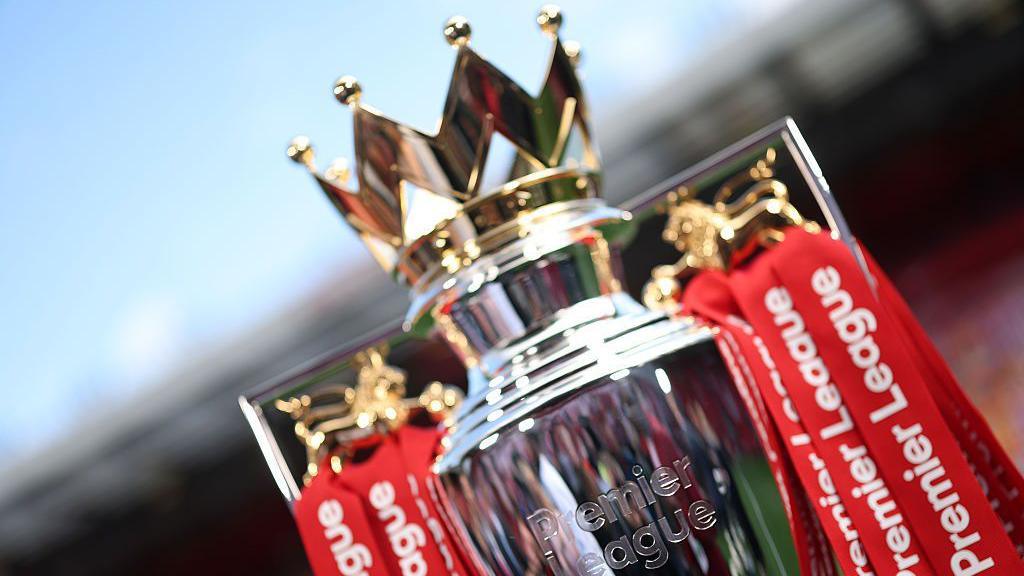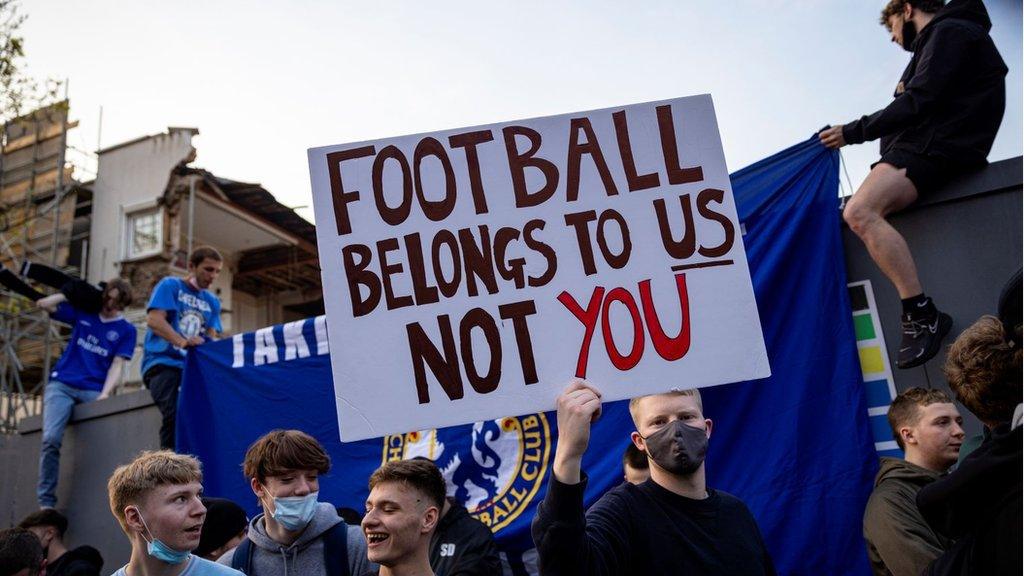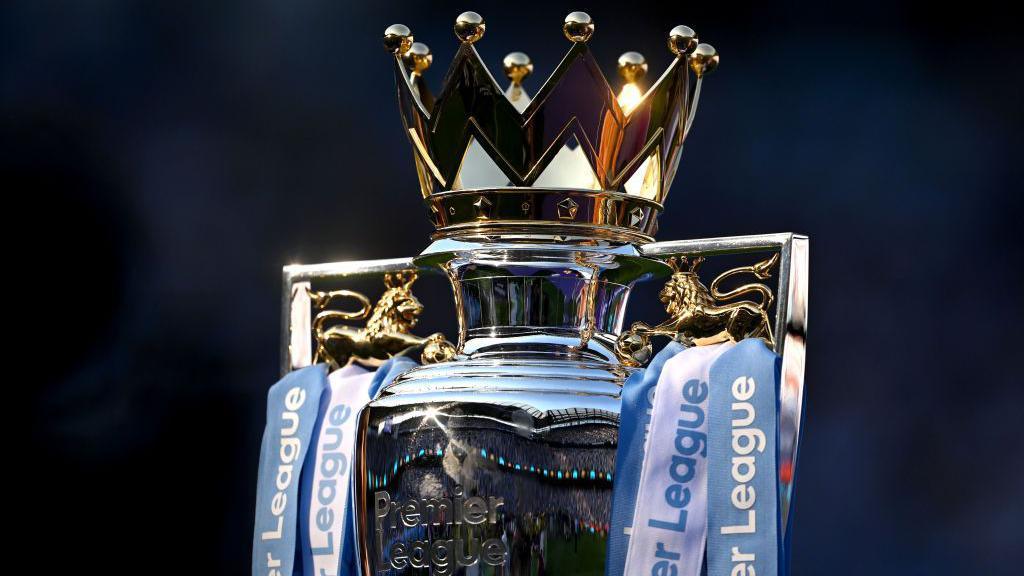'Historic' football regulator bill becomes law - what it means for fans

The new Independent Football Regulator (IFR) will aim to safeguard the future of football
- Published
Football fans have hailed a "historic moment" for English football after a bill to establish an independent football regulator became law.
Prime Minister Keir Starmer said the bill was a "proud and defining moment for English football" and will usher in a "stronger, fairer future" for the game.
"This is an historic moment for football in this country," said Football Supporters' Association (FSA) chief executive Kevin Miles.
The Football Governance Act will grant powers to a body that is independent from government and football authorities.
It received Royal Assent on Monday, which means it has passed into law and establishes the regulator to oversee the men's game in England's top five divisions.
The regulator was a recommendation of a fan-led review into the game and a similar bill was introduced in March 2024 by the then Conservative government, but it failed to pass through Parliament before a general election was called in May. The Labour government reintroduced the bill four months later.
The regulator will be launched later this year. The government said the football industry would be consulted before changes are brought into force.
"Our landmark Football Governance Act delivers on the promise we made to fans. It will protect the clubs they cherish, and the vital role they play in our economy," Starmer added.
As well as improving financial sustainability across the football pyramid, the regulator will also stop clubs from joining breakaway competitions, like the attempted European Super League proposal in 2021, which was roundly condemned by fans.
In its passage through Parliament, there was opposition from some Conservatives. West Ham United vice chair Karren Brady told the House of Lords there were "dangers lurking" in the bill, arguing it would affect competition. The Premier League was also critical of the need for a regulator.
Speaking to BBC sports editor Dan Roan, Culture Secretary Lisa Nandy said: "This is a huge moment for football fans because we've had far too many clubs including mine, Wigan Athletic, at risk from poor ownership and finances.
"This is the moment football fans can breathe a sigh of relief because we are fixing the foundations of football and putting fans back at the heart of the game where they belong."
The Premier League is yet to comment but has repeatedly argued that English football is capable of governing itself, stating a regulator, external will have "unprecedented and untested powers to intervene in the distribution of [its] revenues".
It also said a regulator could have "a negative impact on competitiveness, clubs' investment in world-class talent and the aspiration that drives our global appeal and growth".
This is a huge moment for football fans - Culture Secretary Lisa Nandy
What powers will the independent football regulator have?
Tough new financial regulation to make sure clubs have a long-term sustainable future
Stronger tests to stop rogue owners
New standards for fan engagement in club decision-making
Ban on clubs joining closed-shop competitions and breakaway leagues
'Backstop powers' to ensure a fair financial distribution between leagues
Protections for key club heritage aspects like home shirt colours and club badges and stadium moves
'Watershed moment' for English football
Nandy highlighted some of the future changes supporters will see, now the bill has been passed into law.
"For fans like Sheffield Wednesday, who I spoke to at the start of this journey, it will mean you can't have the colours changed without fans being in the room and part of the decision-making process," she said.
"For Wimbledon supporters it will mean your stadium can't be relocated without you having a say. It will put fans back in the rooms where decisions are made, it will mean all clubs have to reach the standard of the best clubs."
English Football League (EFL) chairman Rick Parry said the bill is a "watershed moment in the history of English football" and would mean clubs could "rise and fall through the pyramid without the threat of financial catastrophe".
The IFR could also help the EFL and Premier League reach an agreement on a new funding deal, which Parry says is currently "destabilising, ever widening, and deeply unfair" .
Kieran Maguire, Associate Professor in Football Finance at University of Liverpool, said the legislation will protect clubs from "exploitation", and the IFR is a necessary safeguard to ensure clubs "are not treated solely as assets".
Miles said the FSA will work with the IFR to ensure fans' voices remain "at the forefront of the debate".
He added: "We are very proud that the FSA was at the heart of change, helping to bring in laws which can help protect the clubs we love from the worst excesses of owners throughout the professional game."
Before Reading were taken over by ex-Wycombe Wanderers owner Rob Couhig in May, the club had faced a turbulent few years under previous owner Dai Yongge, who was disqualified as an owner by the EFL after the club dropped to League One amid a series of transfer embargoes and deductions amounting to a total of 18 points.
Sarah Turner, chair of Supporters Trust at Reading (STAR) said it welcomes the IFR, as Royals fans had seen first-hand the "damage caused" by bad ownership. "Jobs are lost, community projects are cut and businesses suffer," she added.
Anti-discrimination body Kick It Out said the bill is a "massively important step for the financial sustainability of football, the preservation of its heritage status, and putting fans from all communities at the heart of decision-making".
Related topics
- Published9 November 2021

- Published21 December 2023

